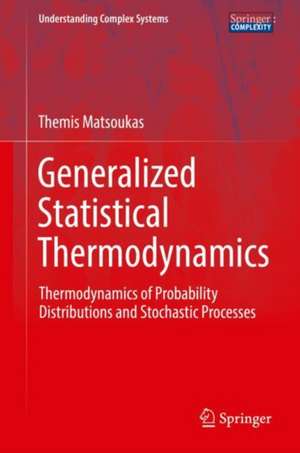Generalized Statistical Thermodynamics: Thermodynamics of Probability Distributions and Stochastic Processes: Understanding Complex Systems
Autor Themis Matsoukasen Limba Engleză Hardback – 20 mai 2019
The first part of the book develops the theory for discrete and continuous distributions while the second part applies this thermodynamic calculus to problems in population balance theory and shows how the emergence of a giant component in aggregation, and the shattering transition in fragmentation may be treated as formal phase transitions.
While the book is intended as a research monograph, the material is self-contained and the style sufficiently tutorial to be accessible forself-paced study by an advanced graduate student in such fields as physics, chemistry, and engineering.
Din seria Understanding Complex Systems
- 18%
 Preț: 1112.30 lei
Preț: 1112.30 lei -
 Preț: 439.25 lei
Preț: 439.25 lei - 18%
 Preț: 1119.38 lei
Preț: 1119.38 lei - 15%
 Preț: 401.82 lei
Preț: 401.82 lei - 18%
 Preț: 1247.26 lei
Preț: 1247.26 lei - 15%
 Preț: 641.20 lei
Preț: 641.20 lei - 15%
 Preț: 642.68 lei
Preț: 642.68 lei - 15%
 Preț: 651.51 lei
Preț: 651.51 lei - 18%
 Preț: 946.55 lei
Preț: 946.55 lei - 18%
 Preț: 947.98 lei
Preț: 947.98 lei - 20%
 Preț: 650.27 lei
Preț: 650.27 lei - 18%
 Preț: 952.09 lei
Preț: 952.09 lei - 18%
 Preț: 957.13 lei
Preț: 957.13 lei - 18%
 Preț: 943.88 lei
Preț: 943.88 lei -
 Preț: 398.35 lei
Preț: 398.35 lei - 5%
 Preț: 1417.54 lei
Preț: 1417.54 lei - 15%
 Preț: 648.42 lei
Preț: 648.42 lei -
 Preț: 387.75 lei
Preț: 387.75 lei - 18%
 Preț: 1133.76 lei
Preț: 1133.76 lei - 18%
 Preț: 948.16 lei
Preț: 948.16 lei - 20%
 Preț: 655.85 lei
Preț: 655.85 lei - 18%
 Preț: 1113.09 lei
Preț: 1113.09 lei - 20%
 Preț: 655.53 lei
Preț: 655.53 lei - 15%
 Preț: 653.00 lei
Preț: 653.00 lei - 18%
 Preț: 1332.92 lei
Preț: 1332.92 lei - 18%
 Preț: 1010.48 lei
Preț: 1010.48 lei - 18%
 Preț: 955.56 lei
Preț: 955.56 lei -
 Preț: 384.22 lei
Preț: 384.22 lei - 18%
 Preț: 950.66 lei
Preț: 950.66 lei - 15%
 Preț: 638.43 lei
Preț: 638.43 lei - 15%
 Preț: 644.49 lei
Preț: 644.49 lei - 15%
 Preț: 647.40 lei
Preț: 647.40 lei - 15%
 Preț: 649.06 lei
Preț: 649.06 lei - 15%
 Preț: 639.25 lei
Preț: 639.25 lei - 15%
 Preț: 643.65 lei
Preț: 643.65 lei - 18%
 Preț: 960.78 lei
Preț: 960.78 lei - 15%
 Preț: 649.87 lei
Preț: 649.87 lei - 15%
 Preț: 645.47 lei
Preț: 645.47 lei
Preț: 1118.30 lei
Preț vechi: 1363.78 lei
-18% Nou
Puncte Express: 1677
Preț estimativ în valută:
213.99€ • 228.83$ • 178.42£
213.99€ • 228.83$ • 178.42£
Carte tipărită la comandă
Livrare economică 17 aprilie-01 mai
Preluare comenzi: 021 569.72.76
Specificații
ISBN-13: 9783030041489
ISBN-10: 3030041484
Pagini: 242
Ilustrații: XXI, 363 p. 57 illus., 55 illus. in color.
Dimensiuni: 155 x 235 mm
Greutate: 0.72 kg
Ediția:1st ed. 2018
Editura: Springer International Publishing
Colecția Springer
Seria Understanding Complex Systems
Locul publicării:Cham, Switzerland
ISBN-10: 3030041484
Pagini: 242
Ilustrații: XXI, 363 p. 57 illus., 55 illus. in color.
Dimensiuni: 155 x 235 mm
Greutate: 0.72 kg
Ediția:1st ed. 2018
Editura: Springer International Publishing
Colecția Springer
Seria Understanding Complex Systems
Locul publicării:Cham, Switzerland
Cuprins
Chapter1: Evolution of Ideas on Entropy.- Chapter2: The Cluster Ensemble.- Chapter3: Thermodynamic Limit (ThL).- Chapter4: The Most Probable Distribution in the Continuous Limit.-Chapter5: Phase Transitions – The Giant Cluster.- Chapter6: The Bicomponent Ensemble.- Chapter7: Generalized Thermodynamics.- Chapter8: Irreversible Clustering.- Chapter9: Kinetic Gelation.- Chapter10: Fragmentation and Shattering.
Notă biografică
Themis Matsoukas is a professor of chemical engineering at Penn State. He has taught graduate and undergraduate courses in chemical thermodynamics for over 20 years and is the author of an undergraduate textbook on the Fundamentals of Chemical Engineering Thermodynamics (2012, Prentice Hall). His research focuses on nano-colloidal systems and in the application of stochastic methods to population balance models He has been recognized with several awards at Penn State, including the George W. Atherton Award for excellence in Teaching and the Outstanding Teaching Award from the Penn State Engineering Society. He received his undergraduate degree from the National Technical University of Athens, Greece, and his PhD from the University of Michigan, both in chemical engineering
Textul de pe ultima copertă
This book gives the definitive mathematical answer to what thermodynamics really is: a variational calculus applied to probability distributions. Extending Gibbs's notion of ensemble, the Author imagines the ensemble of all possible probability distributions and assigns probabilities to them by selection rules that are fairly general. The calculus of the most probable distribution in the ensemble produces the entire network of mathematical relationships we recognize as thermodynamics.
The first part of the book develops the theory for discrete and continuous distributions while the second part applies this thermodynamic calculus to problems in population balance theory and shows how the emergence of a giant component in aggregation, and the shattering transition in fragmentation may be treated as formal phase transitions.
While the book is intended as a research monograph, the material is self-contained and the style sufficiently tutorial to be accessible for self-paced study by an advanced graduate student in such fields as physics, chemistry, and engineering.
The first part of the book develops the theory for discrete and continuous distributions while the second part applies this thermodynamic calculus to problems in population balance theory and shows how the emergence of a giant component in aggregation, and the shattering transition in fragmentation may be treated as formal phase transitions.
While the book is intended as a research monograph, the material is self-contained and the style sufficiently tutorial to be accessible for self-paced study by an advanced graduate student in such fields as physics, chemistry, and engineering.
Caracteristici
Extends the language of thermodynamics to stochastic processes Establishes statistical thermodynamics as a field of probability theory Covers the development of ideas from statistical thermodynamics to information theory and maximum entropy Appeals to researchers and academics working in statistical mechanics, stochastic processes, percolation, and complex systems
